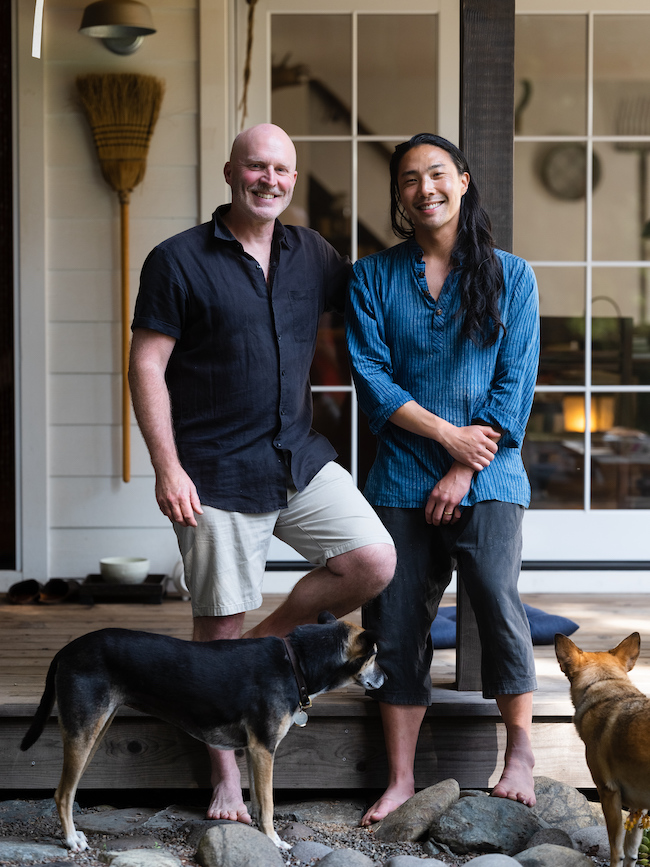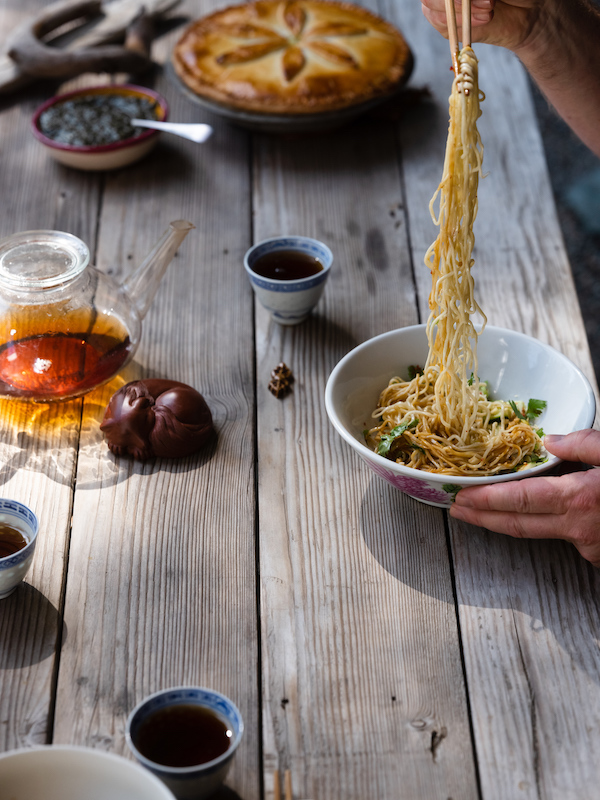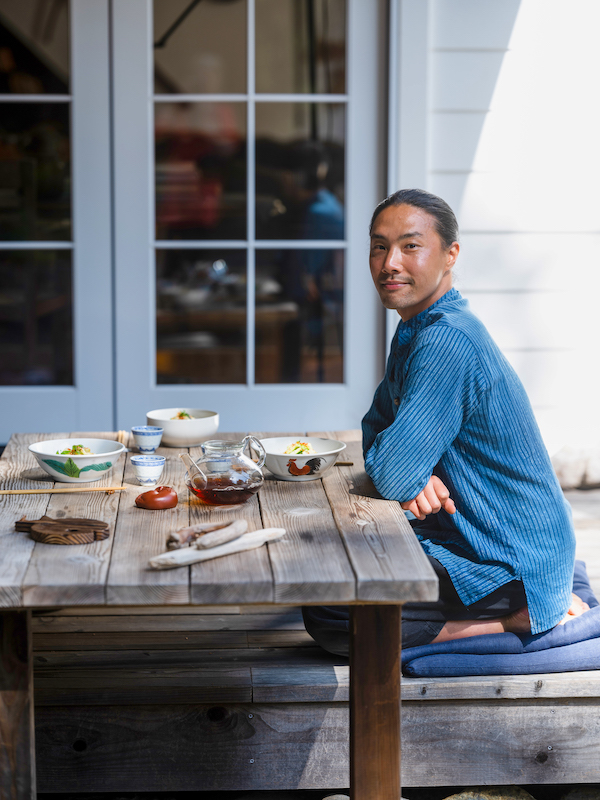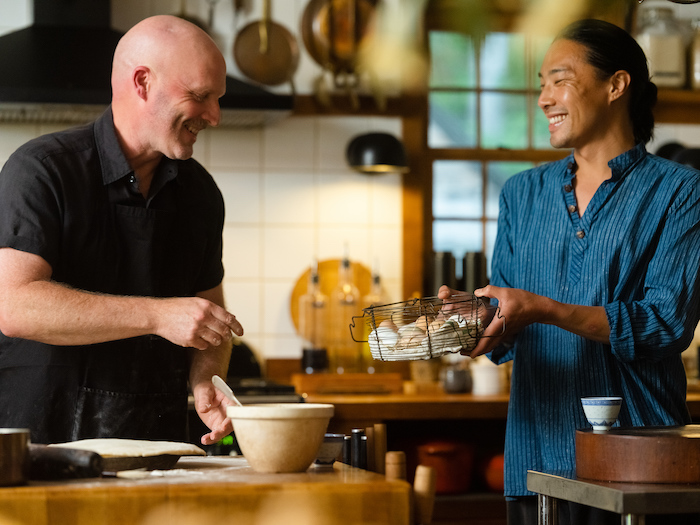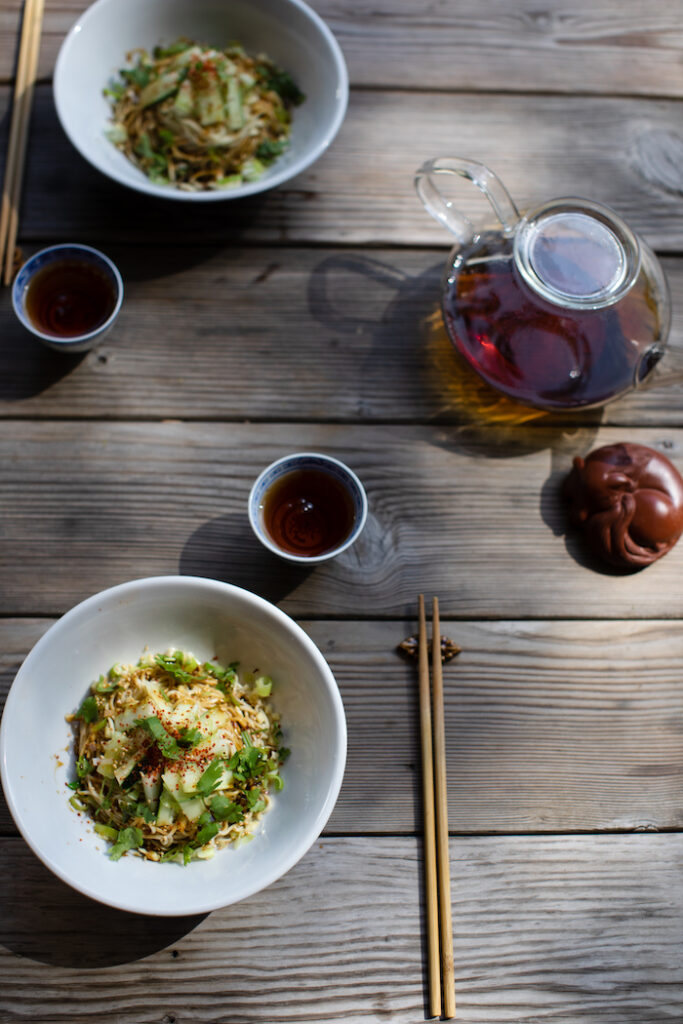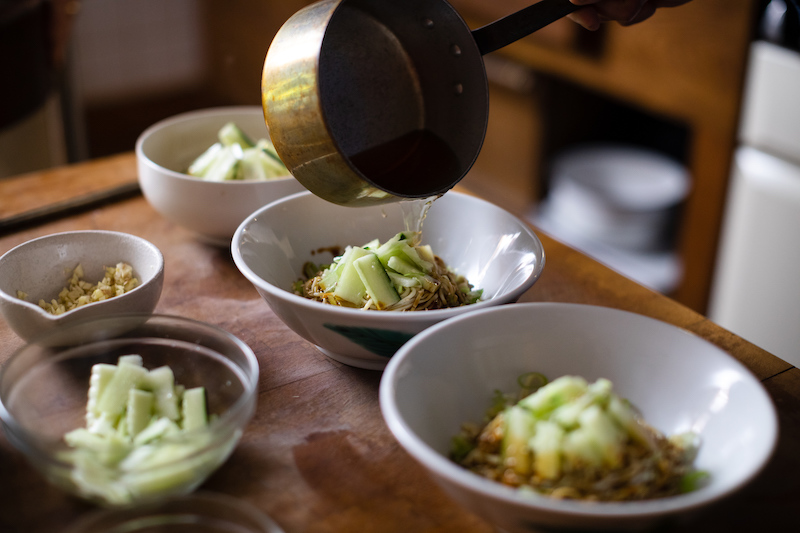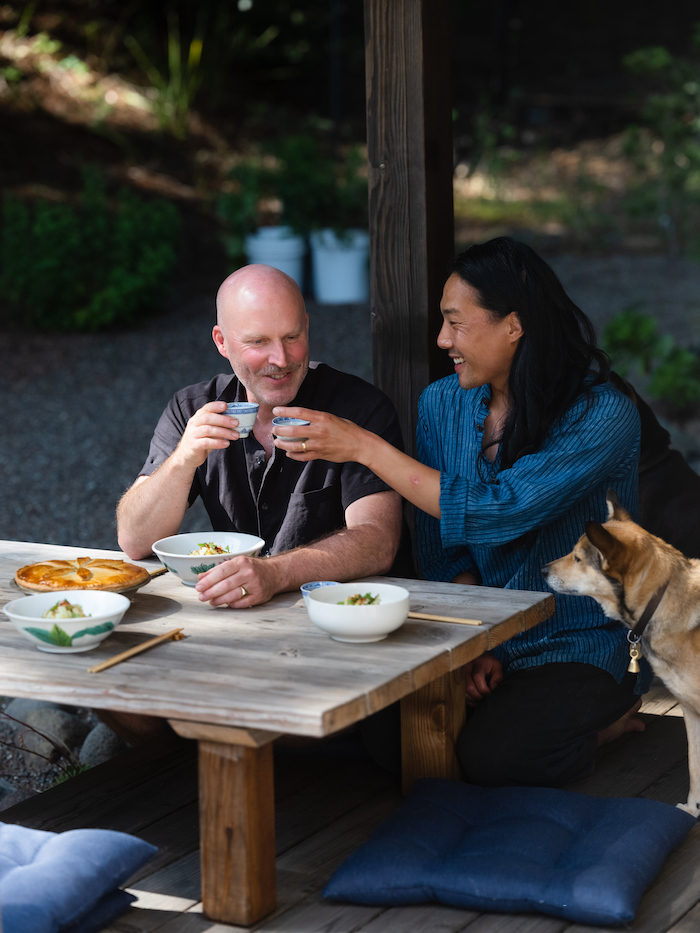Photos – Paige Green Photography
“We are not great at promoting or selling ourselves,” Adrian Lewis-Chang tells me right away as we sit down to discuss the constellation of cooking classes and clubs, pop-ups, and community creation that he and his husband Chris Lewis-Chang offer under their Morihouse umbrella. When I ask him why that is, he ponders for a moment before saying, “Well, Chris is British, you know, very humble and polite, and I grew up Chinese so it’s rude to talk about how great you are.” I assure him that as a congenital American and huge fan of everything Morihouse, I have no such cultural or egoic hang-ups.
It is fitting that Adrian is sipping white tea as we converse: late this summer Morihouse will be launching their own line of tea thoughtfully sourced from employee-owned and women-run tea gardens in Nepal, India, Taiwan and China. “Tea is such an integral part of Chinese and British cultures, so we both grew up with tea being a mechanism, like food, to bring people together.”
Although Adrian and Chris have no restauraterial aspirations, they are dreaming up a teahouse-inspired gathering space for yum cha (“drink tea” in Cantonese) and snackable dim sum (the characters for dim sum mean “full heart” or “complete heart”) where culture and community can commingle like they do at Morihouse’s popular pop-ups, hosted by Neon Raspberry Art House in Occidental. These events, featuring seasonally influenced heritage fare and dinner party vibes, inspire long, early lines and typically sell out within two hours.
In the meantime, their Joy Luck Dumpling Club fills the gap. “It is a dumpling cooking class but also a yum cha community gathering where people are communing over tea and then eating, conversing, and being together.”
Heritage is different from tradition
People often ask if his recipes are “traditional,” says Adrian. “The methods may be, but nothing about it is traditional because there is nothing traditional about me.” Adrian describes his third-generation upbringing as “an interesting juxtaposition of cultures.” His dad was raised in Orange County, “basically the only Asians in a very white, conservative community,” while his mom had deep ties to San Francisco’s Chinatown and mostly spoke Cantonese. He describes his own experience as akin to having a foot in each world without fully being a part of either. Consequently, his culinary creations are infused with healthy nostalgia for the Chinese and Korean foods he ate growing up, elements of Chris’s British and Celtic roots (like savory meat pies and laverbread, a Welch seaweed), and the foods they enjoyed together while living in places such as Tokyo and Sri Lanka.
Adrian met Chris while living in Japan. In food, Chris and Adrian found connection to each other as well as an invitation to deep dive into their own cultures and integrate flavors alongside fragmented and sometimes fraught relationships with home and heritage. “Tradition often slips into the realm of ceremony, which can become rigid and limiting, especially for people who do not come from the motherland,” Adrian cautions. “For those of us in the diaspora, how we connect to our heritage becomes about so much more than tradition.”
This is what love tastes like
“The time that it takes to brew a proper pot of tea, not just dunking a tea bag, or the time it takes to prepare dim sum lovingly for someone—the process behind the things we love sharing is as important, if not more important, than the actual things,” Adrian says. Almost everything that Morihouse serves is lovingly and laboriously made from scratch—from noodles and tofu to banchan (small Korean side-dishes) and Gukganjang (“soup soy sauce”). Gukganjang is a byproduct of making Doenjang, a fermented soybean paste similar to miso. The fermenting soybeans soak for a few months, infusing the brine which, after at least a year of aging, results in a light soy sauce that deepens in flavor and complexity over time.
Seasonal vegetables are sourced almost entirely from Leslie Wiser’s Radical Family Farms in Sebastopol, which specializes in growing culturally relevant crops for the Asian diaspora. Adrian considers Leslie a kindred spirit dedicated to connecting food and heritage via farming vegetables that she remembers eating with her Taiwanese and Chinese relatives—including celtuce, Chinese headed mustards, bitter melon, long beans, kohlrabi, and all basils.
At a recent fundraiser for Occidental Pride’s August event, Out in the Woods, I had the fortune of eating a Hainan chicken and rice bento served with fresh ginger and scallion-infused oil, sambal (a type of Malaysian chili sauce), and a dark soy sauce called lao chou. Alongside were eggs from Morihouse’s own chickens, boiled for six minutes and then marinated for a few days in a soy-based broth, sweet and sour Cantonese daikon and carrot pickles, Napa cabbage and garlic chive kimchi, and bok choy namul. While some might describe such pristine, masterful cuisine as elevated, I find grounded or centered more apt. With an exquisite balance of complexity and simplicity, a delectable Morihouse meal is the crystalline essence of holistic nourishment.
“You too!” moments
Adrian tells me that something he consistently hears at his pop-ups, where people converse in leisurely lines and at communal tables, is, “Thank you for creating this space; it’s so nice to be here with so many new friends!” I counter with something I hear about Morihouse gatherings, particularly from my Asian friends: “It’s so nice to be here with so many Asians!” He nods emphatically. This is a big part of why their Sticky Rice Supper Club, a traveling potluck group open to all Asians and Pacific Islanders and their blended families, has been so meaningful.
“It is important for Asians to have opportunities to gather, not because we want to be exclusive, but because it is so difficult, especially in these more rural parts of the North Bay where it can feel so isolating,” Adrian tells me, describing the value of having “a space where we can be together and experience those ‘you too!’ kind of moments. Even if it is as simple as making fried rice with chopped up luncheon meat for the potluck, and someone is like, ‘Oh my God, my grandma used to put sandwich ham in my fried rice too!’ . . . Even those little things can mean a lot.”
To find information about all things Morihouse as well as seasonal recipes curated around the microseasons of the traditional Chinese calendar, sign up for their thoughtful newsletter, Little Forest, at mori.house.com, or find them on Instagram @mori.house. For more information about Radical Family Farms’ CSA program, visit radicalfamilyfarms.com

